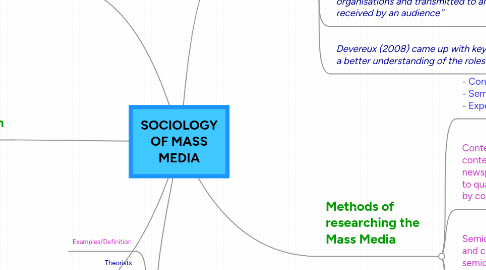
1. McQuail (2000)
1.1. The media is signification in terms of culture & it provides us with their image of 'Social Reality' and it also expresses our 'Shared Identity'
2. Determinism
2.1. Some see the media as a beneficial institution which educates, informs and entertains its audience.
2.2. Others see it in a negative light and say it controls its audience. Viewers are faced with transmitted messages based on the concept of 'determinism' (human behaviour being fixed consequences of particular events or experiences) It denies/minimises the possibility of free choice
2.3. McLuhan (1964) - "Media Determinism", argues that new media technologies have a determining influence on social change.
3. Censorship
3.1. Ways of regulating and controlling the media, which involves preventing or restricting the audience from being reached.
3.2. Can be used by the government and regulatory bodies; Government Censorship includes the use of Official Secrets Act and DN Notices in order to prevent reporting of public on the fact that they harm the national security.
3.3. Watershed is a form of censorship whereby contents on television are restricted from broadcasting before a certain time
3.4. Formal Censorship; regulating by official bodies like the government. Informal Censorship; used by media professionals based on mutual agreements and informal discussion.
4. KEY
4.1. Examples/Definition
4.2. Theorists
4.3. Negatives
4.4. Main Topics
5. Mass Media
5.1. New media such as; satellite television, WAP mobile phones and the internet make it possible for information to circulate around the world
5.2. McLuhan (1971) - world has become a Global Village due to all new forms of the Mass Media
5.3. McCullagh (2002) - defined the media as ''simply the means through which content, whether fact or fiction, is produced by organisations and transmitted to and received by an audience''
5.4. Devereux (2008) came up with key aspects that give a better understanding of the roles of the Mass Media
5.4.1. - Mass Media as means of communication between 'senders' and 'receivers' - Mass Media texts as cultural products with social, cultural and political importance - Mass Media industries as organisations - Mass Media texts as agents of social change and globalisation - Mass Media as agents of socialisation and powerful sources of social meaning
6. Methods of researching the Mass Media
6.1. - Content Analysis - Semiology - Experiments
6.2. Content Analysis; used to analyse contents of media products i.e. newspapers/magazines. Often used to quantify parts of the media content by counting or measuring it.
6.2.1. Lobban (1974) & Best (1993) used content analysis to look at gender representations in children's reading schemes. By counting the numbers appearing in such categories like Heros or Heroins. (Quantitative approach)
6.2.2. Negatives: 1. There's a general problem with using secondary data (i.e. biased sample). 2. Meaning of ''content'' is not operationalised
6.3. Semiology; involves analysing the meaning of signs and codes within cultural context. Some sociologists semiotic analysis to reveal what they think is an ideological message. Feminists also use this to analyse messages of gender role ideology
6.3.1. Negatives: 1. Analysis relies on the researchers analysis of the content 2. Presents researchers analysis of the content but not in the way that the audience receive the message 3. Lacks Reliability
6.4. Experiments; the use of this is influenced by methodology of natural sciences. Social scientists like Psychologists use laboratory experiments whilst Sociologists prefer field experiments - which are more likely to be found in studies of Media where variables are manipulated in order to analyse their influence
6.4.1. Negatives: 1. Ethical issues based on informed consent 2. Lack of validity due to the artificial environment 3. Hawthorne Effect (participant being influence by the researcher to act in the way they desire)
